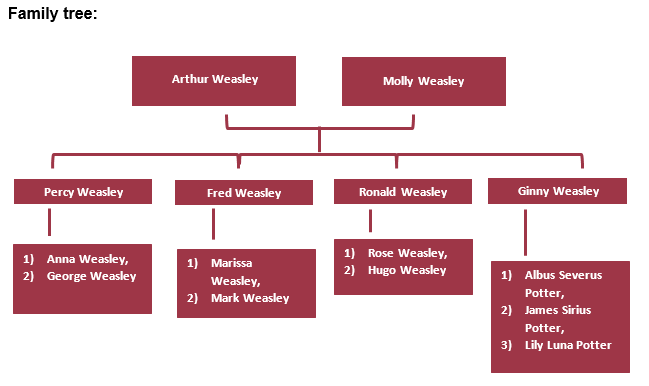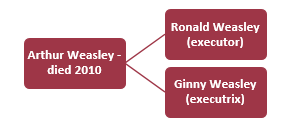What is a “Chain of Executorship” in Probate?
I) ILLUSTRATION

In 2010, Arthur Weasley passed away, a testator leaving a will. He appointed his daughter, Ginny Weasley, and his son, Ronald Weasley, as the executrix and executor, respectively.

2020: Ronald Weasley died testate and appointed his son, Hugo Weasley as the sole executor of his will.

2021: Ginny Weasley died testate and appointed Albus Severus Potter as the sole executor of the will.

Both Ronald and Ginny Weasleys (“original / prior executors”) died leaving the Arthur Weasley’s estate remain unadministered fully.

Question: Who is supposed to continue administering Arthur Weasley's remaining unadministered estate in accordance with the Will of the late Arthur Weasley?
II) EXPLANATION
Unless:
- There is an established chain of executorship from the original executors to continue administering the remaining estate of the deceased Arthur Weasley,
- The prior executors passed away without leaving a will, in other words, died Intestate, or
- The chain of executorship is broken,
then all remaining assets of the deceased Arthur Weasley must be managed by the executor of the last surviving executor of the deceased, as per Section 12(1) of the Probate and Administration Act 1959.
In simpler terms, in this particular case, the new executor shall be Albus Severus Potter, appointed by Ginny Weasley, who is the last surviving executrix of the deceased Arthur Weasley because she died in 2021, while Ronald Weasley died in 2020, by way of Chain of Executorship.
Alternatively, if an Executor passes away before fulfilling their responsibilities in estate administration, their entitlement to a Grant of Probate (“GP”) of the deceased persists, and the appointment of new Executors occurs automatically without the need for additional formalities.
III) APPLICABLE LAWS
Let us understand the definition of an executor, as derived under Section 2 of the Probate and Administration Act 1959 (“the Act”): "A person to whom the execution of the last will of a deceased person is, by the testator's appointment, confided," which includes a person deemed to be appointed executor with respect to settled land.
Executors can be classified as follows, according to Halsbury's Laws of Malaysia, Wills, Probate, Administration, and Succession, Volume 1:
- General executor: A person appointed to administer the testator's entire will and property.
- Special executor: An executor appointed for specific purposes or property, with a clear limitation in the will.
- Executor de son tort: A person who intermeddles with the estate without being appointed as executor or obtaining a grant of administration.
- Executor according to the tenor of the will: A person appointed to perform essential executor duties as per the will's construction.
- Executor by representation: An executor of a sole or last surviving executor of another testator, forming a chain of representation.
Chain of Executorship is governed under Sections 12(1), 12 (4) and 14(2) of the Act, which detail the rights and responsibilities of executors in the chain of representation to a testator.
The case of Re Ramanathan; AR A Nachiappan (1998) 1 CLJ 379, adjudicated by Justice Augustine Paul, illustrates that the chain of executorship is a continuous process, governed by Section 12 of the Probate and Administration Act 1959.
IV) CONCLUSION
The individual responsible for administering Arthur Weasley's remaining unadministered estate, according to the Will of the late Arthur Weasley, is Albus Severus Potter, provided that the chain of executorship is not broken (e.g., by Albus Severus Potter's refusal to apply for a Grant of Probate for Ginny Weasley). This conclusion is drawn for the following reasons:
- Albus Severus Potter is the sole executor appointed by Ginny Weasley in her last will and testament.
- Ginny Weasley was the last surviving executor of the late Arthur Weasley's Will, as she passed away in 2021 after Ronald Weasley, who died in 2020.
Therefore, Albus Severus Potter's rights, if he continues to administer Arthur Weasley's estate, are as follows, according to Section 12(4) of the Act:
- He shall have the same rights as the original executors, as if they were still living.
- He is answerable for the estate that has come into his hands, as if he were an original executor.
If you have any questions or require any additional information, please contact our lawyer that you usually deal with.
This article is written by
Kenneth Tan Chik Wai
Partner, Low & Partners
Nur Amirah binti Noor Azlan
Legal Associate, Low & Partners
Related Articles
Rights Over the NCR Land
Jurisdiction Under Sections 48 and 49 of the Law Reform (Marriage and Divorce) Act 1976: A Comprehensive Analysis
Governing Non-Profit Organizations In Malaysia: How To Legally Set Up Your Organization?
Understanding the Protection for Guarantors in Bankruptcy Proceedings
Questions? We're here to help
